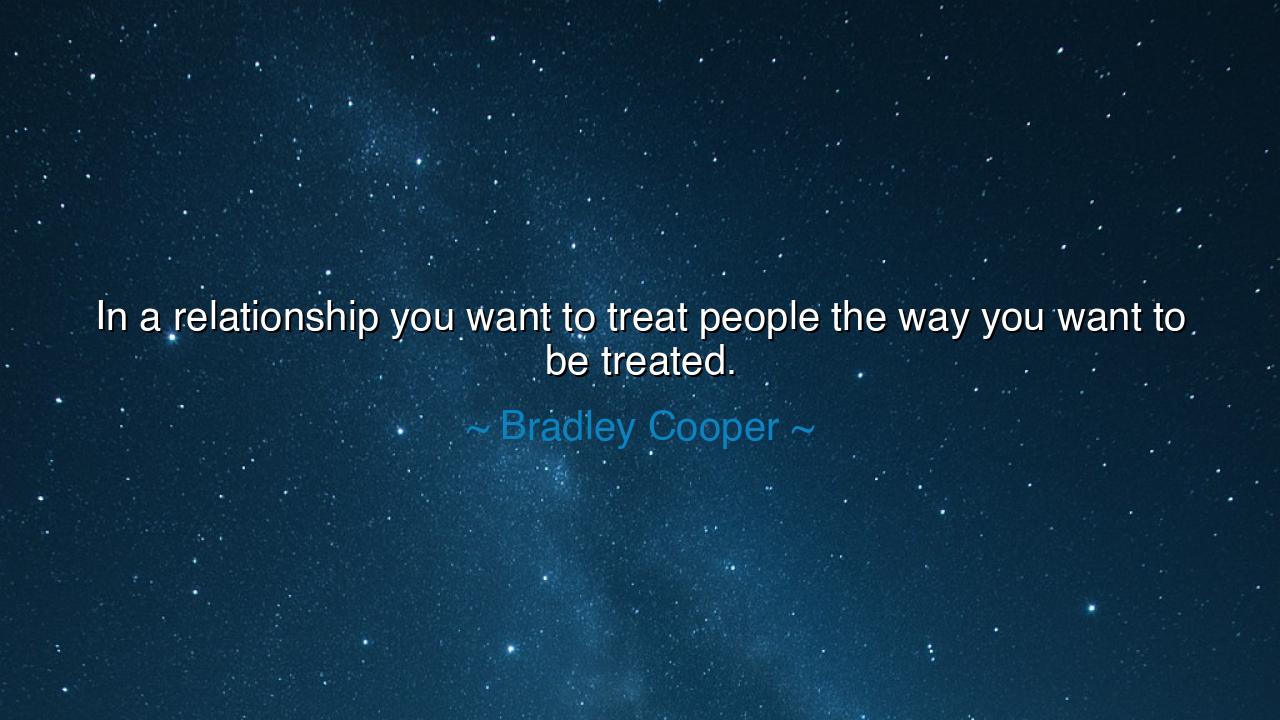
In a relationship you want to treat people the way you want to






The actor and truth-bearer Bradley Cooper once declared: “In a relationship you want to treat people the way you want to be treated.” Though simple to the ear, this teaching resounds with the weight of eternal law, for it mirrors the golden wisdom spoken by sages throughout the ages. A relationship is not built upon desire alone, but upon the balance of respect, compassion, and mutual regard.
To treat people as you yourself wish to be treated is to recognize the divine sameness of all hearts. No man hungers for scorn, no woman yearns for neglect; each soul craves kindness, understanding, and dignity. In offering these to another, you both honor them and awaken the same in yourself. Thus, the circle of care is completed, and the relationship becomes not a chain of demand, but a living bond of equality.
Yet, when this teaching is ignored, discord arises. If one seeks only to receive and not to give, if one demands tenderness while offering coldness, the relationship crumbles beneath the weight of imbalance. As the ancients taught, harmony requires reciprocity; without it, suspicion, bitterness, and sorrow take root. The seed you plant in another’s heart shall be the fruit you one day taste.
Cooper’s words are not born of novelty, but of timeless truth. They echo the voice of prophets, philosophers, and elders who knew that the foundation of all human bonds rests in reciprocity. To give what you hope to receive is not weakness but wisdom, for in doing so, you weave a fabric of trust that no storm can easily tear.
So let this teaching be passed on: in every relationship, be it of love, of friendship, or of family, walk with the measure you desire for yourself. Sow patience, and you will reap peace. Sow kindness, and you will harvest joy. Thus the ancient law endures—what you give in spirit, you shall surely receive.






TPTu Phan
Bradley Cooper’s quote is a great reminder of the importance of respect in relationships. But when it comes to actually practicing it, how do we ensure that we’re not just projecting our own desires and needs onto others? Everyone has their own way of feeling valued or cared for, so how do we balance treating others with the respect we want while understanding their personal preferences and boundaries?
B101 .van tien binh 11tin
I love how Bradley Cooper sums up such an important concept so simply. However, in relationships, I’ve found that people don’t always want the same treatment they give. Sometimes, it’s hard to know if you’re giving the right kind of care or attention. Does this idea still apply when you’re dealing with different love languages or emotional needs? How can we use this principle while also respecting individual differences?
HNHau Nguyen
This quote by Bradley Cooper really resonates with me because it emphasizes empathy in relationships. But I wonder, is treating someone how you want to be treated always the best approach? What if your needs and desires are different from those of your partner? How can we ensure we’re truly understanding and fulfilling the other person’s needs, not just treating them the way we’d like to be treated ourselves?
BNDinh Thi Bich Ngoc
I agree with this sentiment—it’s such a basic principle of kindness, yet it’s not always easy to follow. When you’re in a relationship, you naturally want to be treated with respect and love, but can you always expect the same treatment from your partner? How do we ensure that we’re truly treating someone in a way they appreciate, rather than just how we wish to be treated? Could there be times when it’s more complex than this simple rule?
Ccongviet
Bradley Cooper’s quote makes me reflect on how simple yet powerful the golden rule is in relationships. Treating others the way you want to be treated seems so straightforward, but is it really that easy in practice? Sometimes, people’s needs and preferences are different, so how do we navigate those differences? Can we truly treat someone exactly how we want to be treated, or do we need to understand their unique needs?